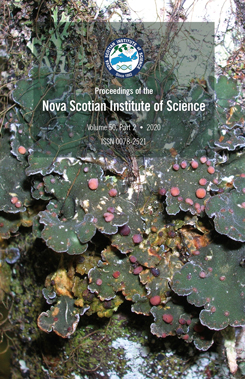Absence of recovery in a degraded eelgrass (Zostera Marina) bed in Nova Scotia, Canada: Results from a transplant study
DOI:
https://doi.org/10.15273/pnsis.v50i2.10001Abstract
By the early 2000s, the invasion of the European green crab (Carcinus maenas) had caused a severe decline of eelgrass (Zostera marina) beds in eastern Canada. The formerly lush eelgrass bed in Benoit Cove, Nova Scotia, was extirpated by 2009 and has subsequently failed to recover.
The objective of our study was to establish if Benoit Cove (BC) has reached a new equilibrium in which eelgrass cannot recolonize. From
July 3 - August 29, 2018, we transplanted eelgrass using frames and monitored eelgrass growth and survival relative to the nearby donor (control) site in Tracadie West Arm (TWA) that had an extensive eelgrass meadow with over 95% cover. Transplant survival was 91.6% and 15.4% for TWA and BC, respectively (P < 0.001). Above-ground growth declined at both sites, and could be associated with high summer water temperatures and/or extreme epiphytism. Sediments at both sites had high silt composition (> 28%), and the absence of a macrophyte canopy lead to increased light attenuation in BC in moderate wind and tidal currents. The low density of green crabs in both BC and TWA (0.01 m-2 and 0.08 m-2, respectively), and the apparently healthy eelgrass bed in TWA, suggest that green crabs are not having a negative effect on eelgrass in this system and are not responsible for the lack of recolonization of eelgrass in BC.
Keywords: Atlantic Canada; eelgrass bed; European green crab; transplant; Zostera marina


